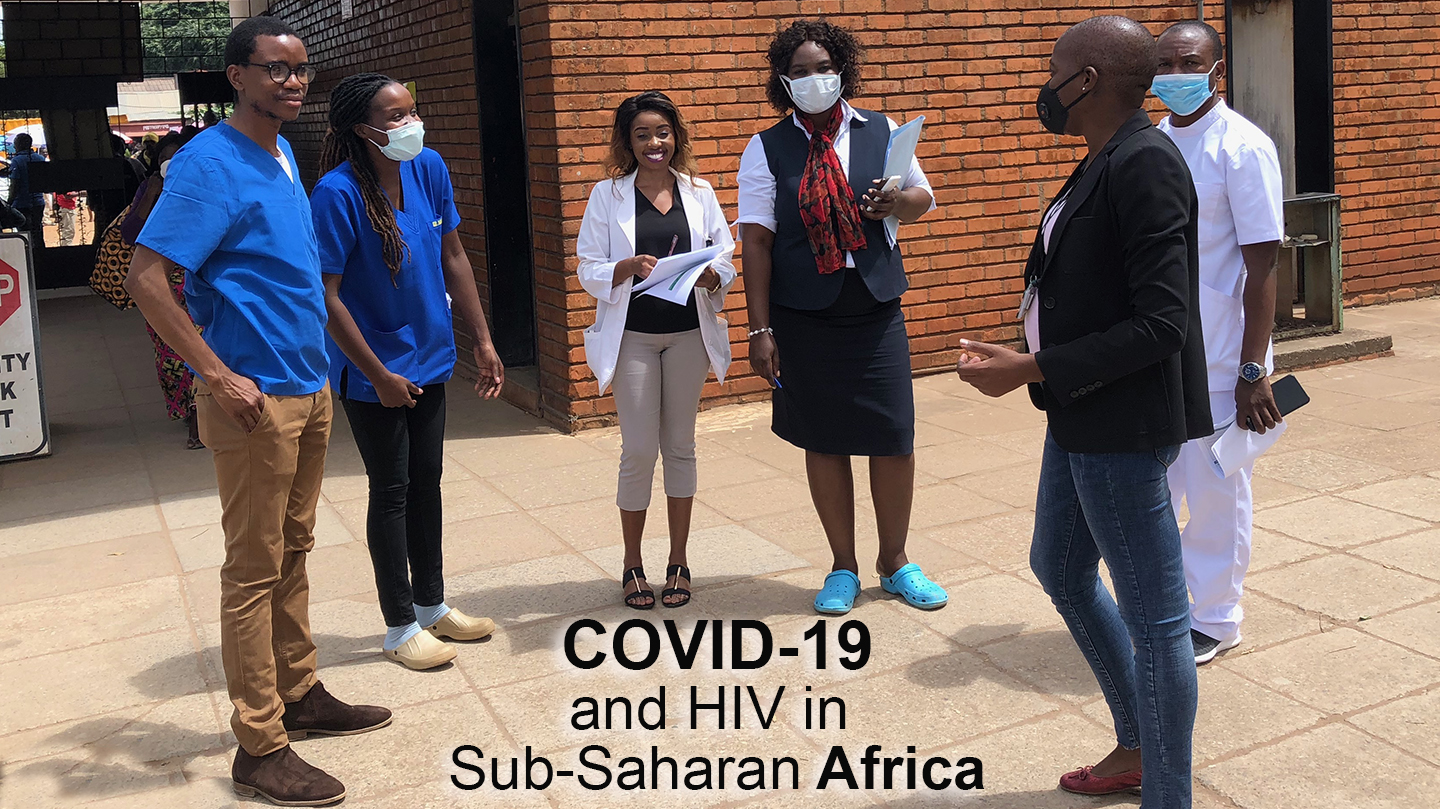Zambia
Since 2004, the University of Maryland, Baltimore has been helping to build Zambia’s capacity to assess and treat HIV/AIDS.* Ciheb now operates with a staff of more than 120 Zambian healthcare professionals and provides services to more than 300 health facilities. It also partners with the University of Zambia to provide advanced HIV and infectious disease training at the University Teaching Hospital (UTH).
The outbreak of COVID-19 has created new challenges for Ciheb’s HIV work in Zambia; the first COVID-19 case was identified in late March and nearly 500 cases have since been recorded. To assist with the rapidly evolving COVID-19 response, Ciheb has been providing technical guidance for assessing patients for COVID-19, while also supporting grassroots efforts to produce protective cloth masks.
Providing Clinical Expertise at the National Level
UMB School of Medicine infectious disease physicians Dr. Lottie Hachaambwa and Dr. Cassidy Claassen, both working with Ciheb in Zambia, have been instrumental in developing national COVID-19 case-management guidelines for the Zambian Ministry of Health. They have also been providing clinical guidance for COVID-19 cases -- particularly severe cases -- that have been admitted at Levy Mwanawasa General Hospital in the capital city Lusaka.
 In addition to case management, the two doctors are ensuring that health facilities in remote areas beyond Lusaka have access to the latest clincial guidance with respect to COVID-19 and HIV, and have been participating on expert panels providing telementoring assistance through Project ECHO.TM
In addition to case management, the two doctors are ensuring that health facilities in remote areas beyond Lusaka have access to the latest clincial guidance with respect to COVID-19 and HIV, and have been participating on expert panels providing telementoring assistance through Project ECHO.TM
ECHO, which stands for Extension for Community Health Outcomes, uses teleconferencing to link specialists with practitioners and create “communities of practice” in underserved areas. Ciheb Senior Medical Advisor Dr. Mope Shimabale has also been delivering critical training to doctors and nurses at rural healthcare facilities on new HIV and COVID-19 guidelines. Prior to social distancing rules being imposed, Dr. Shimabale traveled to rural clinics to answer questions and provide other guidance in person.
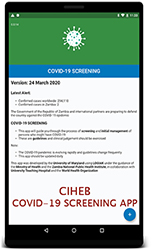 To further assist Zambian physicians in screening respiratory patients for COVID-19, Ciheb Zambia developed a smartphone app. The app helps clinicians determine whether a patient’s clinical symptoms require testing for COVID-19 by guiding them through a series of screening questions. The app also can be continually updated as case definitions change. Data collected by the app, in turn, will help to monitor the outbreak.
To further assist Zambian physicians in screening respiratory patients for COVID-19, Ciheb Zambia developed a smartphone app. The app helps clinicians determine whether a patient’s clinical symptoms require testing for COVID-19 by guiding them through a series of screening questions. The app also can be continually updated as case definitions change. Data collected by the app, in turn, will help to monitor the outbreak.
Dr. Hachaambwa, who hails from the City of Choma in Zambia's Southern Province, expects the number of COVID-19 cases to increase markedly in Zambia as testing increases; he is concerned that it will severly strain his country's resources. Dr. Hachaambwa is preparing to do all that he can to rise to the challenge while also carrying on Ciheb's HIV work. "We are ensuring that HIV care continues during this period so that the gains previously made are not lost," he said.
Getting Ahead of the Curve
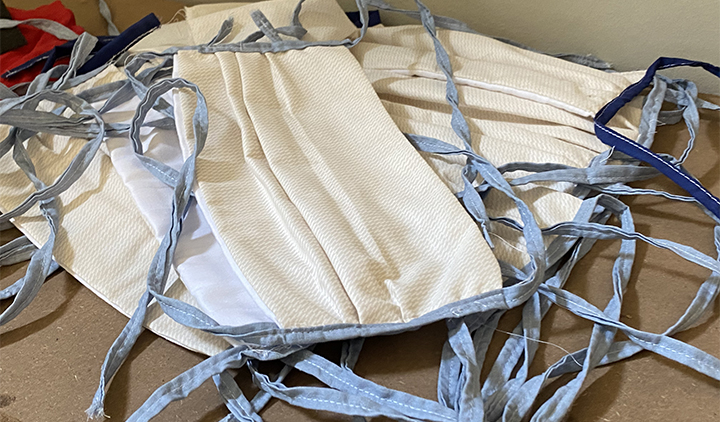
Concerned community members in the capital city Lusaka joined together in late March to form a loosely organized coalition to manufacture cloth masks. The Lusaka Coalition of Community Sewers -- comprised of seamstresses, tailors, and others -- was formed out of concern of the looming threat of COVID-19, knowledge that Zambia had few resources for equipment, and a desire to contribute to the response in a substantive way.
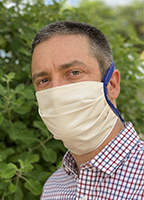 Dr. Claassen has been providing technical guidance to the group, including on elements of mask design, suitable deployment in hospitals, and proper care and cleaning.
Dr. Claassen has been providing technical guidance to the group, including on elements of mask design, suitable deployment in hospitals, and proper care and cleaning.
“One of the main goals of the guidance we provided was to help preserve the supply of medical-grade protective equipment (such as N-95 respirators) for as long as possible,” said Dr. Claassen. In addition to making the masks available to patients with respiratory symptoms, the cloth masks were also suitable for surgical use. “We advised hospitals to use the cloth masks in any application that would require surgical masks," explained Dr. Claassen.
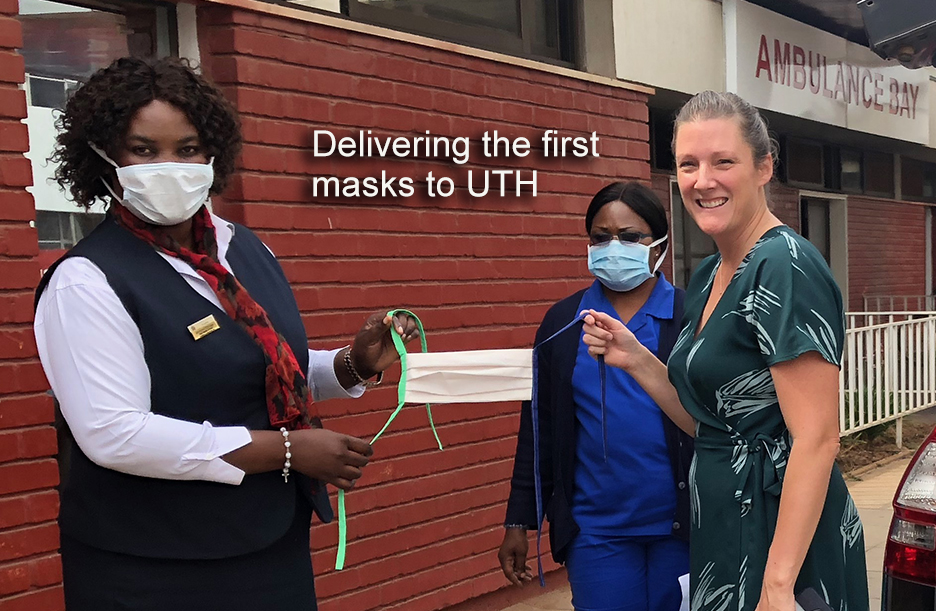
10,000 Masks and More
The coalition delivered approximately 1,000 masks to UTH in Lusaka in the first week (Dr. Claassen also trains clinicians at the hospital). UTH has since requested an additional 10,000 masks. The Coalition of Community Sewers continue to use private donations and resources provided by the Mennonite Central Committee and local business, such as the Zambian breweries, to make the masks. The group is searching for additional resources from bilateral donors to scale up production to meet demand.
The Zambian Ministry of Health announced on April 4 that face masks should be worn by everyone. The announcement spurred widespread making of masks. The Lusaka Coalition has been sharing their cloth-mask design so that others can produce effective mask wear.
Dr. Claassen, along with other Ciheb staff, continue to support the frontline work being done in Zambia. When asked whether he will be returning to the States anytime soon, Dr. Claassen's response was: “Right now my work is meaningful here.”
*Ciheb and the Institute for Human Virology have been implementing PEPFAR-funded responses to the HIV/AIDS epidemic in Zambia since 2004. Ciheb Zambia provides technical assistance to clinics via a family-centered approach for couples, pregnant women, and people living with HIV. It also has pioneered innovative approaches to assist underserved key populations to improve access to services in client friendly settings.


